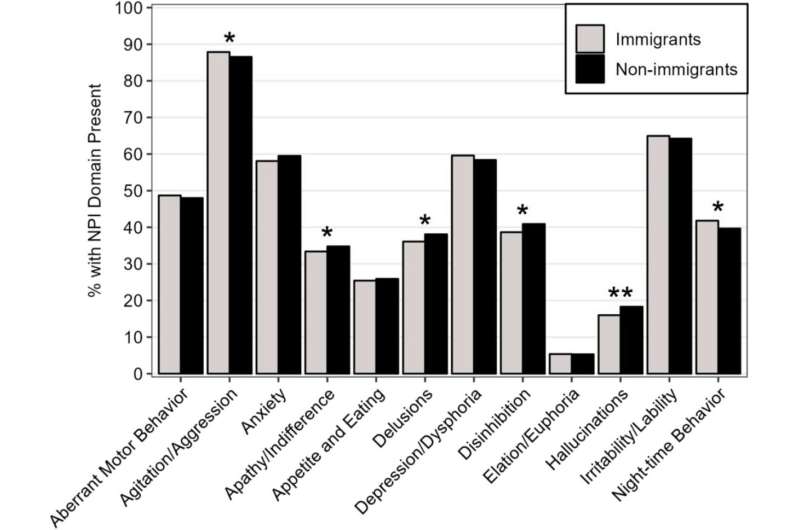This article has been reviewed according to Science X's editorial process and policies. Editors have highlighted the following attributes while ensuring the content's credibility:
fact-checked
trusted source
proofread
Language barriers could contribute to higher aggression in people with dementia

Immigrants living with dementia were more likely to present with agitation and aggression compared with their non-immigrant counterparts, a new study by Edith Cowan University (ECU) in collaboration with The Dementia Center, HammondCare, found.
Researchers from ECU's Center for Research in Aged Care and HammondCare's The Dementia Center noted that behaviors and psychological symptoms of dementia (BPSD), such as agitation and aggression, are common; however, its presentation may be influenced by the cultural background of the person.
A study investigated differences in clinical and demographics characteristics and BPSD between immigrants and non-immigrants living with dementia in residential aged care homes who were referred to Dementia Support Australia (DSA) programs. The study found that immigrants were more likely to present with agitation or aggression, while non-immigrants were more likely to present with hallucinations and delusions. The findings are published in the journal BMC Geriatrics.
DSA, a free dementia behavior support program, has supported over 60,000 clients and 98% of aged care homes in every state and territory since 2016.
BPSD were common between the groups, with language barriers and cultural considerations frequently observed for immigrants, adding to the contributing factors.
"In Australia, over 400,000 people are living with dementia, a number projected to double by 2058, At least 54% of people living in residential aged care homes (RACHs) in 2019—2020 had a dementia diagnosis," said lead researcher Pelden Chejor.
"Over 31% of aged care residents were also born overseas, and 9.2% of people using aged care preferred a language other than English. In 2019–2020, 21% of people living with dementia in RACHs were immigrants from non-English speaking countries. International studies have reported that immigrants experience a higher prevalence of dementia due to differing life experiences including those related to trauma, low literacy, and socioeconomic status."
Chejor and his colleagues noted that loneliness, boredom, language barriers, and cultural considerations significantly contributed to BPSD for non-English-speaking immigrants compared with non-immigrants, with the largest significant differences being for language barriers and cultural considerations. There were no differences in the prevalence of contributing factors between English-speaking immigrants and non-immigrants.
"Our findings indicated a significantly lower rate of hallucinations for immigrants and non-English-speaking immigrants compared to non-immigrants. Additionally, non-English-speaking immigrants were significantly lower on delusions and disinhibition than non-immigrants.
"The higher severity of agitation or aggression is likely driven by communication difficulties as there was no difference for the English-speaking immigrants. Cognitive decline can impair both the ability to express and comprehend spoken language and people living with dementia who have English as their additional language may lose their ability to communicate in English and subsequently use their first language as the primary language of communication," said Chejor.
"Our study calls for increased awareness and education on the impact of culture and language for people receiving residential care and exhibiting BPSD. Future research should explore related factors such as length of stay in Australia and English language proficiency to learn more about BPSD presentations for different immigrant groups. By doing so, we can better manage these symptoms."
Head of DSA Marie Alford said the study reinforced the importance of understanding the person living with dementia, including their cultural background and experiences, likes, dislikes and routines when responding to BPSD.
"Communicating effectively with the person living with dementia, and taking the time to know them, including their language background and culture, is essential," Alford said. "In many cases this can mean responding with support without the need for a pharmacological intervention."
More information: Pelden Chejor et al, Comparing clinico-demographics and neuropsychiatric symptoms for immigrant and non-immigrant aged care residents living with dementia: a retrospective cross-sectional study from an Australian dementia-specific support service, BMC Geriatrics (2023). DOI: 10.1186/s12877-023-04447-3





















